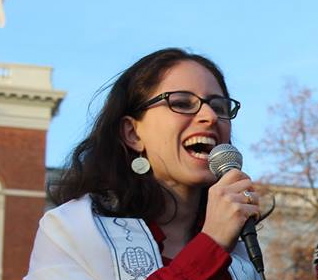When I was a senior in high school I had an alumni interview for entrance into a prestigious college. We sat in a café, and I remember telling the alum about my passion for healing the relationship between people and the earth. I probably used the term ‘environmental activist.’ At the end of the interview he shook my hand and said, “Well, just don’t step on too many toes.”
His warning has stayed with me, but over the years it has become more and more incongruous. Whose toes are we worried about, exactly? There is very little more disruptive than not having breathable air, drinkable water, enough food, and a livable climate. Indeed, we are the first generation to feel the effects of climate change and likely the last to be able to do anything about it. If there was ever a time to step on the toes of the status quo, now is it.
I read the plagues of the Exodus story not as supernatural punishments only, but as examples of the natural consequences that plague a society built on oppression and shortsightedness. If children, animals and the land are suffering and dying, as they are in the Exodus story, it is a pretty good indication the rest of the society is deeply sick. The plagues are thus terrible and awesome wake-up calls. Our responsibility is to awaken to their message, to let ourselves be disturbed by what we see.
In a powerful play on the root peh.resh.ayin, Rebbe Nachman teaches (Likutei Mohoran I, 64:6): “The name Pharaoh is similar to the word taphri’u, you are disturbing, as in ‘why are you disturbing the people from their work?’ (Exodus 5:4).” Pharaoh himself, the root of the oppression and shortsightedness that governs Mitzrayyim, is also the root of the plagues that will eventually disturb the status quo enough to force a radical transformation. Oppression disturbs, and that disruption, if we let it, can rouse society to change.
The plagues of the Exodus do not only afflict the ones who are directly responsible for the oppression. All the waters of the Nile turn to blood. Frogs cover the land. Boils break out on people and animals, and of course, all the firstborn die. Whether directly responsible for the Israelites’ enslavement or not, the people under Pharaoh’s rule suffer. Indeed, we can imagine that the most vulnerable – the elderly, sick, and poor in Mitzrayyim – must have suffered worst from the plagues.
The effects of climate change are not supernatural punishments; they are real consequences of an economy built on the consumption and extraction of fossil fuels. Like the plagues of the Exodus story, those responsible are not the only ones to suffer. In fact, often those least responsible – the poorest around the world and the most ecologically vulnerable –suffer the most.
As the climate justice movement picks up strength around the world, it is different than the environmental movements of previous decades. The decisions the global community makes now about energy, extraction, transportation, food systems, and use of land will make or break the possibility of a livable climate on Earth. Climate change is an issue of human rights and justice. It knows no national boundaries. While the poor and most vulnerable are the first to suffer, ultimately it affects us all.
This year around our seder tables, let’s reflect on the 10 plagues of climate change, symptoms of our warming world that can disturb us enough to take the transformative, courageous action needed to get out of our generation’s deadly Mitzrayyim:
- Rising sea levels
- Drought
- Species extinction
- Spread of vector-born diseases (e.g. by mosquitoes)
- Heat waves
- Crop failures
- Insect outbreaks that threaten food security
- Superstorms
- Wildfires
- Habitat destruction
But perhaps the most powerful biblical plague corollary to modern climate change is the death of the firstborn. As a firstborn myself, this plague has always disturbed me. I take out extra wine from my cup at this point during the Seder. But today I think the firstborn of Mitzrayyim are symbols for all who are beloved and vulnerable in our world – the global poor, children, and animals especially, who have done the least to contribute to the crisis and are suffering the most from it. (For more information on the effects of climate change, visit http://climate.nasa.gov/effects/.)
I encourage us all to get involved in the climate justice movement in whatever ways are accessible to us. There are many groups working on this crisis, and the methods and strategies are diverse. This Pesach I give a shout out to my friends at the Climate Disobedience Center. The CDC supports people taking direct action and peaceful civil disobedience for the sake of a livable climate (www.climatedisobedience.org). If we want to get out of Mitzrayyim, it’s time for bold, heart-centered, spirited public action.
Rabbi Shoshana Meira Friedman is the Assistant Rabbi at Temple Sinai of Brookline, MA, and on the leadership team of the Mass Interfaith Coalition for Climate Action (MAICCA). She was ordained by Hebrew College Rabbinical School, and is an alum of Oberlin College, JOIN for Justice, and the Wexner Graduate Fellowship. She lives in Jamaica Plain, MA with her husband, Yotam Schachter. For articles, sermons, music & climate work visit www.rabbishoshana.com.
Want to receive Torah from T’ruah in your inbox every week? Sign up here!

